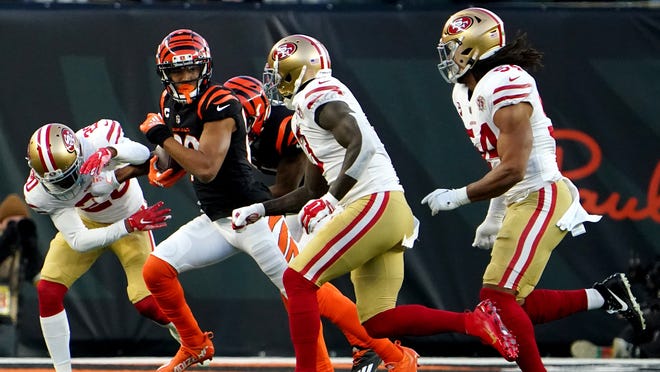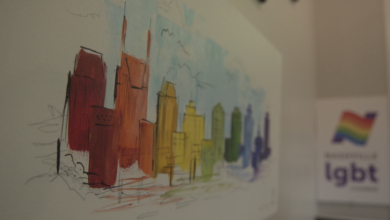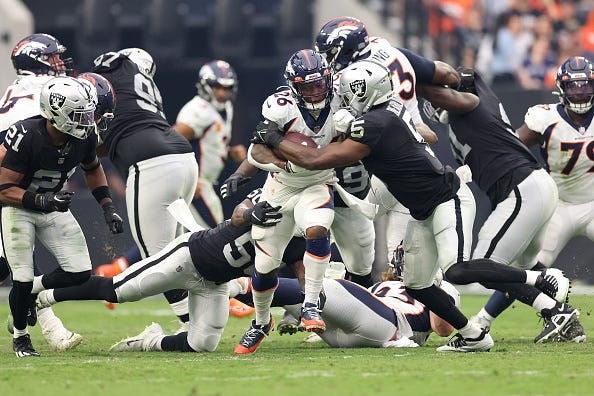Corrections/clarifications: This story originally misstated the number of plaintiffs.
On the first day of a high-profile lawsuit over the deadly 2017 white supremacist rally in Charlottesville, Virginia, plaintiffs' attorneys argued that the violence was premeditated by the event's organizers and leaders.
The defendants and their lawyers acknowledged their views are repugnant to most Americans, but contended police are to blame for the violence because they shut down a permitted rally and pushed opposing groups into the downtown streets, where mayhem ensued.
The "Unite the Right" rally started on Aug. 11, 2017, with lines of clean-cut white men carrying torches across the University of Virginia campus, chanting, "Jews will not replace us!"
It ended when neo-Nazi James Fields drove his car into a crowd, killing Heather Heyer. Fights broke out between white supremacists and counterprotesters. In all, 35 people were injured.
Fields was convicted of murder and sentenced to life in prison.

Thursday, lawyers for the plaintiffs, a group of nine Charlottesville residents, played evocative and shocking videos from the rally. They argued that the violence was pre-ordained by extremist leaders and white supremacist groups, and said they'll be able to prove the defendants engaged in a conspiracy to commit violence.
"We expect, when the defendants stand up here today, they are going to continue the strategy of plausible deniability," said Karen Dunn, one of the attorneys representing the plaintiffs. "They'll say this case was not about their planning, execution and celebration of racially motivated violence."
Draining their wallets:Lawsuit over Charlottesville 'Unite the Right' rally has crippled white supremacist groups, leaders
White supremacist recruiting:How podcasts have become the backbone for white supremacist recruiting
White nationalist Richard Spencer, probably the best-known of the defendants, did just that. He argued that while he holds ideas that most Americans find abhorrent, he didn't engage in any conspiracy to commit violence at the rally.
Spencer is one of 24 defendants in the suit. Seven have default judgments against them.
Expressing lament for the tragic events in Charlottesville, Spencer said the chaos that unfolded was not in any way premeditated.
"The poet Robert Burns said that, 'The best-laid plans of mice and men often go awry,'" he said. "When I look back on Charlottesville, I feel absolutely that my best-laid plans went awry."
Saying he views Charlottesville as "a kind of disaster and learning experience," Spencer introduced the idea that Charlottesville police were largely responsible for the violence.

In their opening remarks, plaintiffs' attorneys said they have mountains of evidence showing otherwise. They said Spencer and other defendants communicated for weeks before the protests, and they brought items like flagpoles and mace that they weaponized against counterprotesters.
Spencer countered that the evidence will show he was never fully involved in those discussions, and he merely attended the event as a speaker.
In a long-winded, sometimes confusing rant, defendant Christopher Cantwell, who is serving a prison sentence for extortion and is representing himself in the civil suit, argued he wasn't one of the key organizers. He too blamed the police.
Between plugging his now-defunct radio shows and calling himself a good-looking entertainer, Cantwell sought to appeal to the jury by telling them they were "smart people" who would ultimately see the lawsuit as a spurious attempt to chill the speech of American conservatives. Cantwell argued that his racist views don’t result from hatred and should be openly discussed.

W. Edward ReBrook, an attorney for defendants Jeff Schoep and the neo-Nazi National Socialist Movement, which Schoep used to lead, took a similar tack, arguing that the Charlottesville lawsuit has dire consequences for free speech.
Calling himself a "Thrice-vaccinated Democrat," ReBrook said it would be "a waste of your time and my time time to try and humanize people who harbor beliefs that most of us would spend our last breaths opposing."
ReBrook started to describe how the case could chill free speech, but Judge Norman Moon quickly shut him down.
The final straw for Moon came when ReBrook cited actor Brad Pitt's character Aldo Raine in the 2009 Quentin Tarantino movie Inglorious Basterds.
"He said he likes his Nazis out in the open, in uniform – that way you can identify them," ReBrook said. "That won't be the case if they're underground. You have to ask yourself: Where will they be more dangerous?"
Moon quickly interjected, chiding ReBrook that this lawsuit is about "money damages," not about "other things or ramifications of the verdict that have nothing to do with the jury's considerations."
ReBrook abruptly ended his opening statement.
The Charlottesville lawsuit is the latest in a long line of civil actions brought by groups that seek to financially cripple hate and extremist groups.

In the 1980s and 90s, the Southern Poverty Law Center filed lawsuits against several chapters of the Ku Klux Klan on behalf of plaintiffs who had been intimidated or threatened. The lawsuits caused those chapters to file for bankruptcy or shut down. The SPLC also filed a lawsuit that led to the bankruptcy of the Aryan Nations in 2000.
The Charlottesville lawsuit already has hurt the defendants, a collection of the most notorious extremists in the country. Spencer has called the lawsuit "financially crippling," and five-figure fines have been levied against some of the defendants for failing to produce evidence.
The trial is expected to continue for another two weeks, with the first of the plaintiffs testifying Friday morning.
Source link









